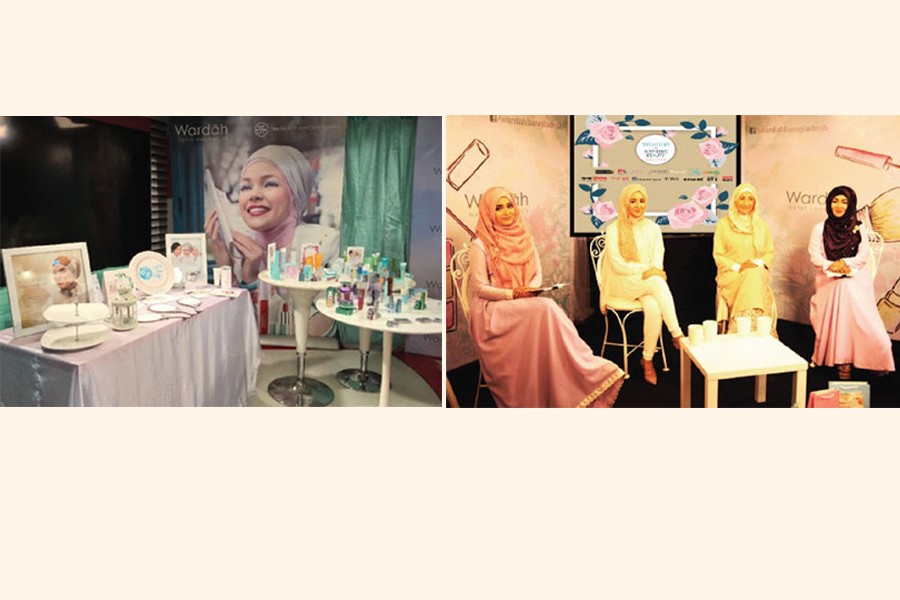A large number of women, mostly Muslims from different walks of life, different cultural backgrounds yet having one thing in common - the desire to wear a dress that guards their modesty - have brought about a revolutionary change in the fashion industry. The change is what is being called the 'modest fashion'.
The modest fashion is a growing industry that is now trending across cultures and national boundaries. Muslim women are the main force who are driving the market ahead and are innovatively pushing boundaries within the fashion sector.
Describing the idea of modest fashion, often termed 'halal fashion', would be a bit difficult as the perception of modesty varies from person to person. Halal fashion can be related to the style of wearing such a dress which gently and modestly covers the whole human body and there is no exposure of any part of the body except face and hands partially. Halal means anything allowed in Islamic law or code.
According to the report on the State of Global Islamic Economy 2017-18, prepared by Thomson Reuters in collaboration with research firm Dinar Standard, Muslim consumers spent an estimated $254 billion on clothing in 2016 against 11 per cent of the global expenditure. The spending is likely to reach $373 billion in 2022.
The rise in Muslims' spending on clothing grabbed the attention of a number of global mainstream fashion brands which take interest in launching Muslim-friendly clothing lines to meet the growing demand for modest fashion.
Dolce and Gabbana, one of the most famous luxury fashion brands of modern time, launched their collection of hijabs and abayas at the beginning of 2016.
DKNY, an American-made company, brought their Ramadan collection for the first time in 2014 and Oscar De La Renta followed DKNY in 2015 with the launch of their Ramadan caftans.
Last month the Swedish retailer H&M launched its first-ever modest collection 'LTD.' It features two sets of designs. The collection caters to all women who prefer to cover up, and most notably Muslim women who wear hijabs.
Modest fashion is also growing in Bangladesh. The country is the fourth largest exporters of clothing to some of the Organisation of Islamic Cooperation (OIC) countries. Bangladesh's clothing exports to the OIC countries stood at $1.30 billion in 2016.
China exported the highest volume of clothing to the OIC countries in 2016 with the value standing at $17.50 billion. It was followed by India with $5.40 billion and Turkey with $2.70 billion in the year under review.
While clothing is considered the main element of modest fashion as well as mainstream fashion, halal-certified beauty products have also joined the long list of such items. These halal products are not tested on animals and they contain no animal products or alcohol.
Halal nail polish is a product many companies are trying to develop. In 2014, Saudi Arabia-based BCI Group launched its halal-certified H nail polish line while Greece-based Safe 'N' Beautiful introduced another one. The UK's Nails Inc also launched a halal-friendly line in 2015.
The world famous Indonesia-based halal cosmetics brand WARDAH, which has recently been introduced in Bangladeshi market by Symon AnMi Innovative Ventures, has more than 300 halal-certified beauty enhancer cosmetics items. Wudoo-friendly 'Maya' nail polishes from the brand have already gained immense popularity.
"A large number of fashion-conscious women were looking for an authentic halal cosmetics brand. With an aim to meet the demand of the urban middle and upper middle class customers who are conscious about their health and beauty and want to use safe and cruelty-free cosmetics, we have brought this halal-certified brand in the Bangladeshi market," said Mr Symon Imran Hyder, Serial Entrepreneur and Chairman of Symon AnMi Innovative Ventures, while replying to a question.
"It was not easy to push the concept of halal cosmetics in the Bangladesh market. There were people who made fun of the concept and surprisingly even Muslim people criticised it at the very beginning. But gradually, these halal cosmetics, especially our wide range of lipsticks, skin care items and perfumes are gaining much popularity among the customers," Mr Hyder added.
The parent company of the brand in Bangladesh aims to build a proper halal cosmetics and personal care line containing the best branded products from all over the world and establish different hubs or points from where people can buy authentic and premium quality halal-certified cosmetics.
WARDAH Cosmetics has also organised the biggest fashion and beauty-related online live talk show on 'Wardah Inspiring Beauty' for the Bangladeshi audience.
When people from all over the world are embracing the idea of modest fashion passionately, Bangladeshis have started showing their interest in halal fashion.
Many female students of colleges and universities now-a-days are seen wearing colourful hijabs with fashionable burkhas, abayas, gowns, caftans, shrugs, tunics, aprons and even with Salwar-Kameez. The trend of wearing a long shirt and a loosely fitted pant with a hijab over the head is gaining much popularity in sultry summer days. Vibrant colours, different cuts and patterns in modest attires are more preferred now.
A good number of fashion designers and entrepreneurs of the country are grabbing the opportunity and launching their own lines of modest clothing. Brands like SCICCOSO, Tahoor, etc. are bringing various collections of hijabs, abayas on different occasions and using their social media platforms to attract their targeted customers.
As there is a growing demand for modest fashion, many more designers, entrepreneurs and businesses will come forward to seize the opportunity of reaching out to the fast-growing Muslim population. It will be really interesting to see how the modest fashion survives in the rapidly-changing fashion industry.


